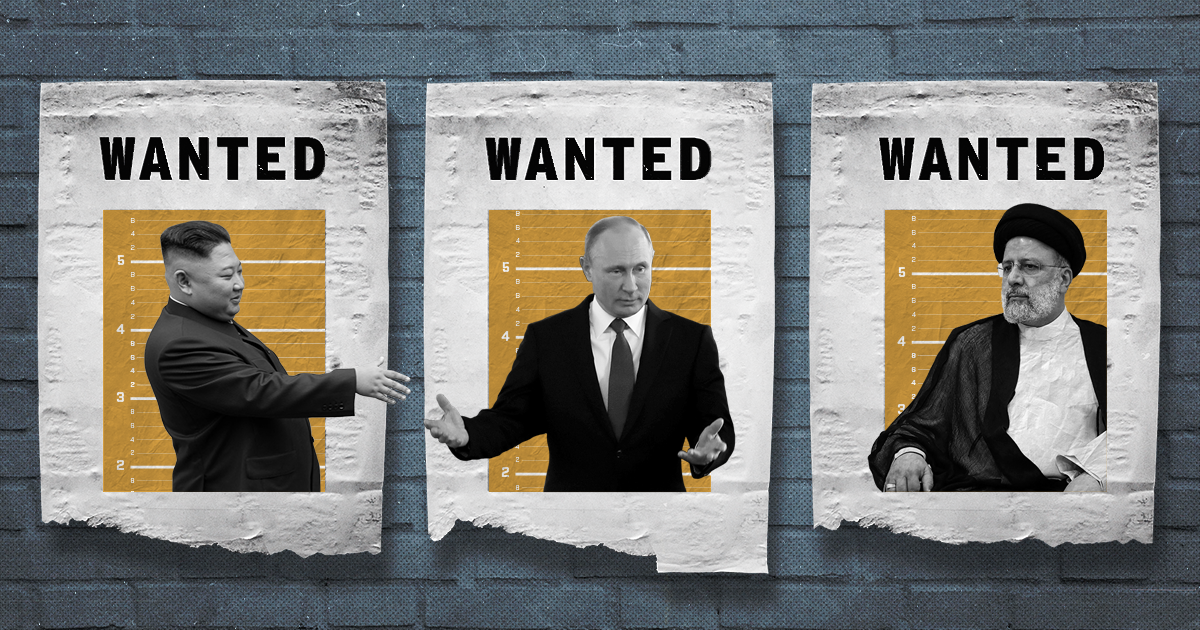Russia, North Korea, and Iran are the world’s most powerful rogue states. They have been working to strengthen their cooperation since Russia invaded Ukraine in February 2022, united by the draconian sanctions levied against them, their shared hatred of the US, and their willingness to violate international law to disrupt a global status quo they believe serves Western interests at their expense. These rogues are agents of chaos in today’s geopolitical order, bent on undermining existing institutions and the governments and principles that uphold them.
Once seen by Russia as a nuisance at best and a liability at worst, North Korea has become an essential resource for Vladimir Putin’s war effort in Ukraine thanks to its pariah status, militarized economy, and large stocks of Soviet-standard artillery ammunition. Meeting in Russia’s Far East in September 2023, Kim Jong Un and Putin struck a deal that sends North Korean artillery shells, rockets, and ballistic missiles to Russia in exchange for Russian food, energy, and – most importantly – technological assistance, especially on satellite development and deployment.
Russia and Iran, longtime partners in a bid to protect Bashar Assad’s regime in Syria, have also upgraded their relationship from a limited tactical alliance to a more comprehensive and strategic military and economic partnership. Tehran has supplied Moscow with kamikaze drones to terrorize Ukrainian cities – now also being built in Russia – and has drawn on its decades of experience to help Moscow evade Western sanctions. For its part, Russia has become Iran’s chief external weapons supplier, its top source of foreign investment, and a key trading partner. Moscow also provides diplomatic cover for Tehran’s nuclear program at the UN Security Council and has developed warm relations with Iranian proxies at war with the United States and Israel in the Middle East.
While less prominent than Russia’s bilateral ties within the axis, North Korea and Iran have a decades-long history of cooperation on nuclear and ballistic missile development. This cooperation has reportedly extended to North Korea supplying weapons and missile designs to Hamas, the Houthis, and other Iranian-backed militant groups.
In 2024, coordination among these rogue states will increase. Deepening alignment and mutual support will pose a growing threat to geopolitical stability as they boost one another’s capabilities and act in increasingly disruptive ways on the global stage.
Russia will be the primary actor here, seeking to bolster its warfighting capabilities in Ukraine while working to deflect Western attention elsewhere. In exchange for North Korean artillery shells and rockets to sustain its war of attrition, Moscow will provide Pyongyang with technologies and know-how to advance its missile, submarine, and satellite programs, with major repercussions for Northeast Asian security. And in exchange for stepped-up provision of Iranian drones, munitions, sanctions relief, and ballistic missiles with which to strike Ukrainian cities, Moscow will supply Tehran with fighter jets and advanced weapons technology. Along with growing Russian support for Iran’s proxies, this will alter the regional balance of power in Iran’s favor at a time when Tehran and its proxies represent a much more direct security challenge to the West. Both bilateral deals will strengthen Russia’s hand in Ukraine and increase that war’s damage and costs.
The severity of existing Western sanctions against all three rogue states and the close cooperation among them means they will not be deterred by fear of further sanctions and isolation. This will unleash them to wage asymmetric warfare (short of direct military attacks) on the US and Europe, including via cyberattacks, support for terrorism, and disinformation campaigns designed to disrupt elections and sow chaos. More generally, the axis’s coordinated sanctions-busting and rule-breaking will undermine the compellent and deterrent power of Western sanctions, emboldening other would-be rogues.
It bears noting that China is not a member of the axis of rogues. Beijing did not openly condemn Russian aggression in Ukraine, but neither did it endorse the invasion or do much to help Putin’s war effort beyond purchasing discounted oil and allowing flows of dual-use goods to continue. (If India and the UAE were less friendly to the United States, analysts would be likening their Russia policies to China’s.) Beijing has looked on warily at the deepening security cooperation between Moscow and Pyongyang – in fact, Chinese officials didn’t know Kim was going to Russia until after it was publicly announced … and they were piqued by it. And while it has ramped up oil imports from and diplomatic support for Tehran, Beijing has no desire to jeopardize its more strategically important interests in the Gulf (particularly its ties with Saudi Arabia and the United Arab Emirates) by helping Iran make regional trouble.
That said, China is often well-served by the three rogues’ anti-Western operations and maintains a de facto policy of pro-axis neutrality. Indeed, without active acquiescence from China, the axis’s rogue activities would be less impactful. Short of violating international sanctions or jeopardizing its own interests, expect Beijing to continue to do business with and legitimize the axis as it undermines the US and its allies this year.
Three caveats are in order. First, Russia, Iran, and North Korea leaning on each other is a sign of their desperation and weakness on the global stage. When your best (and near only) friends are two rogue states, you’re in trouble. Second, all of them seek to avoid an active shooting war with the West, which means continued caution when escalating direct attacks on the United States or its core allies. And third, despite their common interest in sowing chaos, dictators have trouble trusting each other, making the entente a fragile one. This axis is a marriage of convenience and opportunity; its members are neither strategic nor ideological bedfellows – they are focused primarily on regime survival and geopolitical gain. As such, their relationships will remain largely transactional.
Still, the disruptive potential of their growing cooperation – especially with a boost or at the very least a blind eye from Beijing – should not be underestimated.
